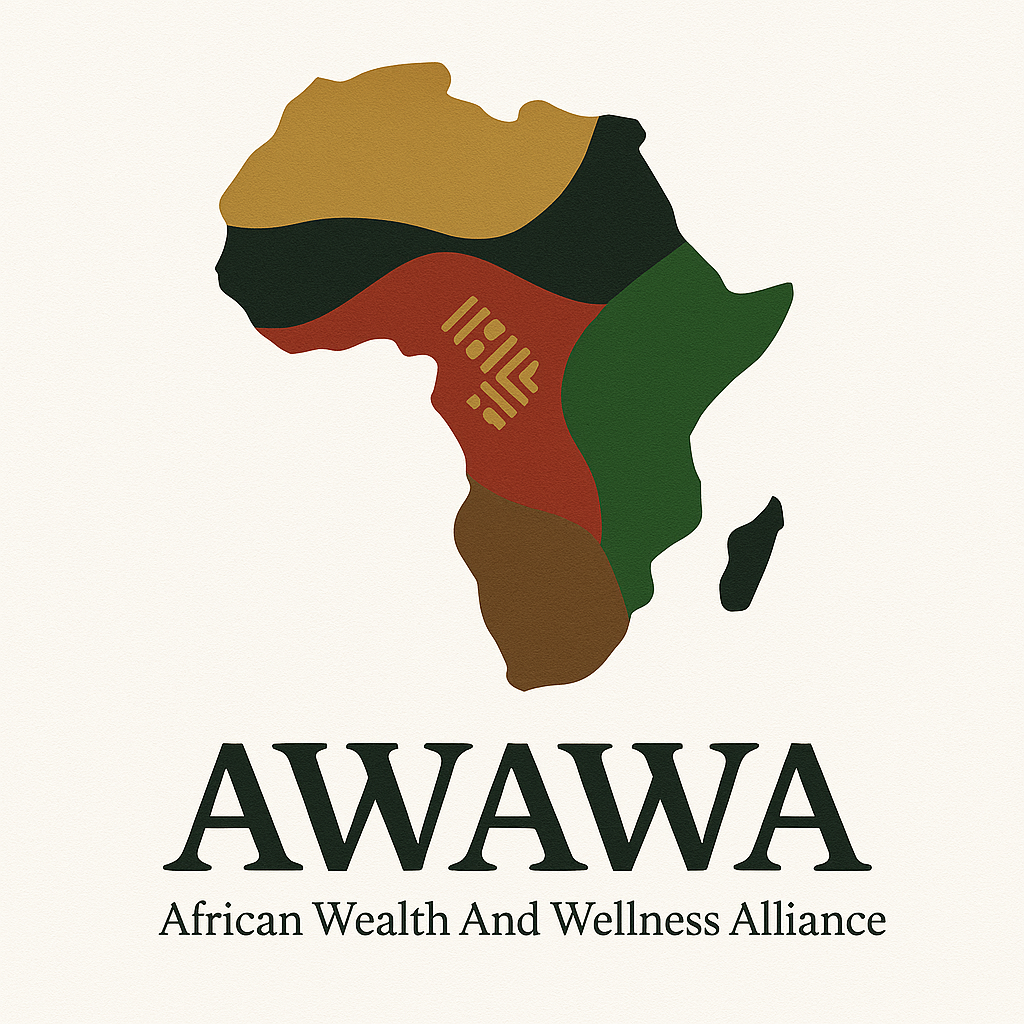Sovereign-AWAWA Funding Framework
Initiatives, Projects, and Programs Eligible for 100% Grants and Interest-Free Loan Combinations
Issued by: African Wealth and Wellness Alliance – Sovereign Stewardship Council
Version: 1.0
Date: June 2025
I. Guiding Principle
Sovereign-AWAWA is committed to funding high-impact, community-centered initiatives across the African continent that restore dignity, sovereignty, and prosperity. All funded initiatives must support at least 63% of the local population and demonstrate measurable alignment with the ADPI, SDI, or QPAMBA frameworks.
Eligible programs may receive:
100% Non-repayable Grants for public good infrastructure and community development.
Interest-Free Loans for income-generating, self-sustaining enterprise development.
Combined Packages where infrastructure and training are grant-funded, and operations are supported with zero-interest loans.
II. Core Categories for Sovereign-AWAWA Support
1. Food Sovereignty and Agro-Industrial Infrastructure
100% Grant Support:
Agricultural Training Academies (modeled after IP3A)
Seed banks and climate-resilient crop nurseries
Irrigation systems, water reservoirs, and soil restoration
Grain and produce storage silos (food security banks)
Community-owned agro-processing centers
Interest-Free Loan Combinations:
Farmer-owned cooperatives and regional agricultural hubs
Equipment leasing collectives for tractors, mills, dryers, and processors
Local organic fertilizer and compost production
2. Workforce Development & Vocational Training
100% Grant Support:
National and regional Quantum Learning Centers (QLCs) for trade skills
Mobile training units for rural and underserved areas
Patriotism-based civic immersion programs (like IP3A model)
Interest-Free Loan Combinations:
Accredited training institutions launching income-generating certification programs
Public-private ventures that employ and train youth simultaneously
3. Community Infrastructure and Public Services
100% Grant Support:
Construction of decentralized Community Empowerment Hubs (The Hub)
Renewable energy microgrids (solar, wind, hydro)
Public sanitation systems, boreholes, and water purification plants
Free community-based transportation (electric bus systems)
Interest-Free Loan Combinations:
Community-led housing cooperatives (materials and labor subsidized)
Village-level commercial marketplaces and ICT service centers
4. Sustainable Defense and Civil Preparedness Programs
100% Grant Support:
Civic-defense training centers for local protection units (non-combat readiness, disaster response)
Reintegration of former combatants or militia into agriculture and vocational sectors
Agro-civic defense zones combining farming, training, and regional security
5. Value Chain Sovereignty and Local Industrialization
100% Grant Support:
Establishment of Ethical Resource Processing Zones (ERPZs): gold, bauxite, lithium, etc.
Infrastructure for storage, logistics, and transportation
Public warehouses and cooperative distribution systems
Interest-Free Loan Combinations:
Manufacturing and assembly of local goods (textiles, tools, construction materials)
Export-focused artisan and agribusiness collectives
6. Health Sovereignty and Wellness Infrastructure
100% Grant Support:
Community wellness clinics with traditional and modern integration
Deployment of mobile medical caravans and detox wellness units
Med Bed operator training facilities and energy-healing labs
Interest-Free Loan Combinations:
Herbal medicine cooperatives and traditional healer education programs
Community-led nutritional product manufacturing (moringa, baobab, etc.)
7. Educational Transformation and Zero-Harm Learning
100% Grant Support:
Construction of Zero-Harm Education Campuses (ZHECs)
Teacher training academies and village-based curriculum development centers
Education access programs for orphans, displaced youth, and rural girls
Interest-Free Loan Combinations:
Start-up capital for independent education cooperatives
Multilingual Pan-African publishing houses for children's books, learning apps
8. Eco-Urbanism and Self-Sustaining Smart Cities
100% Grant Support:
Foundational infrastructure for Self-Sustaining Communities (SSCs)
Renewable power grids, smart water systems, and underground utilities
Free public parks, greenhouses, digital learning kiosks
Interest-Free Loan Combinations:
Locally owned restaurants, hotels, art studios, and eco-tourism centers
African architecture and green construction firms
9. Digital Sovereignty and Quantum Infrastructure
100% Grant Support:
Community-owned high-speed fiber-optic and quantum internet installations
Open-source platforms for decentralized digital identity and finance
Interest-Free Loan Combinations:
Tech cooperatives launching African blockchain applications
Youth-run data centers, AI research hubs, and cybersecurity incubators
10. Diaspora Reintegration and Reverse Migration Programs
100% Grant Support:
Resettlement preparation centers and integration hubs
Language and cultural orientation programs
Return incentives for rural and underserved community deployment
Interest-Free Loan Combinations:
Diaspora-led enterprises in agriculture, education, and clean tech
Ancestral land reclamation and eco-homestead initiatives
III. Funding Metrics and Approval Conditions
Projects must meet the following criteria:
Community Impact: Must benefit 63% or more of a local population.
Measurable Sovereignty Indicators:
Increased food or health self-sufficiency
Local job creation (direct and indirect)
Retention of value chains within community borders
Compliance with the DO-NO-HARM Accord: All applicants and organizations must align with the ethical principles of AWAWA’s Covenant of Stewardship.
IV. Education and Training Infrastructure Clause
All projects—whether agricultural, technological, health, or industrial—must include a fully grant-funded training and educational component.
This ensures workforce readiness, skills transfer, and long-term sustainability, modeled after the IP3A Patriotism-through-Work framework of Burkina Faso.
V. Sample Program Model: Inspired by Burkina Faso’s IP3A
Program: Agricultural Sovereignty & Youth Reintegration Initiative (ASYRI)
Target: 10,000 youth trained and deployed across 150 rural districts
Components:
100% Grant: Training, housing, farming equipment, civic education
Interest-Free Loan: Local seed capital for cooperative agribusinesses
Outcomes Expected:
70% increase in national food reserves
25% youth unemployment reduction
Intercommunal reconciliation through purpose-based work
VI. Conclusion
Sovereign-AWAWA is not merely funding projects. It is funding transformation. Through strategic combinations of full grants for infrastructure and education with interest-free capital for value creation, Africa can leap forward with sovereignty, unity, and purpose.
“Let every village be a university, every citizen a steward, and every field a fortress of dignity.”
Contact:
African Wealth and Wellness Alliance (AWAWA)
Email: afriwealthandwellnessalliance@gmail.com
Web: www.wawa369.org
Slogan: “A Sacred Alliance of Sovereign Africans.”
